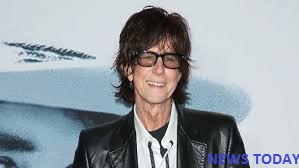Ric Ocasek
Ric Ocasek
A 1979 Rolling Stone element on The Cars opened with a picture from Ric Ocasek's Ohio pre-adulthood that appeared to be out of American Graffiti or some other romanticizing of post–World War II the suburbs: an adolescent beefing up his father's vehicle to race against his companions. Covertly, Ocasek had changed the fumes pipe of his family's Mercury Comet in order to in any event make a more intense vroom, if not a quicker ride.
At the point when his father in the long run discovered, "there was damnation to pay," as Jon Pareles composed. Of his then-incensed dad, Ocasek stated, "He never comprehended why I did it."
That story feels strangely thunderous after Ocasek's passing at age 70-something (he long concealed his introduction to the world date from the press). The smile commendable yet overwhelming music of The Cars shared of perfectly American conventions while likewise overhauling them. Ocasek was a standard breaker, however a careful one. He got a shake and move like a machine, however he likewise knew it as a vessel for enthusiasm, secret, and insubordination.
Framed in 1976 after Ocasek had sorted out and deserted a progression of less effective tasks, the Boston-based Cars touched base with a supernatural occurrence of an introduction single, "Exactly What I Needed," which is as yet its mark tune.
"I supposition you're exactly what I required—I required somebody to sustain," went Ocasek's verses, unpretentiously ruining a comfortable love-melody line with an irresolute jeer, a move he'd rehash through the span of his vocation. The melody's guitar splatters invoked heredity extending from Chuck Berry.
Be that as it may, the cool blue tones of the console and the exact tick-tock of the percussion additionally flagged another time. Or then again rather "another wave," the term that would depict both the alienated punk of the '70s and the synth-fueled move tracks of the '80s, on account of the scaffold The Cars constructed.
The band presented an amazing number of colossally pleasing sing-alongs from the hour of its 1978 introduction collection, The Cars, through 1987's Door to Door, after which the band didn't play together again for over two decades. Its inventory incorporates the applaud and-groan fun of "My Best Friend's Girl," the lively MTV staples "Shake It Up" and "You Might Think," and the resounding, powerful number "Drive.
" These are melodies that everybody knows; they're likewise layouts for huge swaths of present-day pop and shake. The New Pornographers owe Ocasek an obligation, however so does Taylor Swift.
It's fitting that Ocasek filled in as a collection maker for Weezer and No Doubt, two acts that were at that point hurdling down a street that his band had cleared.
It's likewise prominent that Ocasek created works by the band Suicide, whose constrained and exploratory clamor pop never got an opportunity of moving toward The Cars' prosperity. For all his standard intrigue, Ocasek had an ear for the strange.
His verses pushed pop's pointless prosaisms into funny jokes, as heard in the trudging, entrancing title mantra of 1978's "Great Times Roll." He made no statements of regret for grafting electronic components into guitar shake, even when doing so was frequently discounted as suspect and gooey.
In this, he forecasted a great deal about how well-known music would move in the decades after his band's presentation. His interest with then-novel sounds started in secondary school when he'd go through hours in his family's storm cellar tinkering with consoles.
This courageous sonic reasonableness coordinated his nonconformist persona. Journalists labeled Ocasek as "invulnerable" or "impartial," and he copped to being ungainly.
In spite of the fact that he composed practically all the band's tunes and was a capturing artist, he surrendered lead vocal obligations on a portion of the band's greatest and flashiest tunes to the bassist Benjamin Orr.
Ocasek detested visiting and went through decades evading it after The Cars' separation and rather invested his energy recording solo music, delivering others' collections, composing verse, and painting.
At the point when the Rock and Roll Hall of Fame enlisted The Cars in 2018, he rejoined the band for a presentation that, he stated, would be a fitting end to the gathering's run. It turned out to be Ocasek's last appear, topping a lifelong that changed music by clinging to his very own inward standard. "Accomplishment to me," he had said in 1984, "is really having the option to compose melodies and like them when I complete them."













No comments